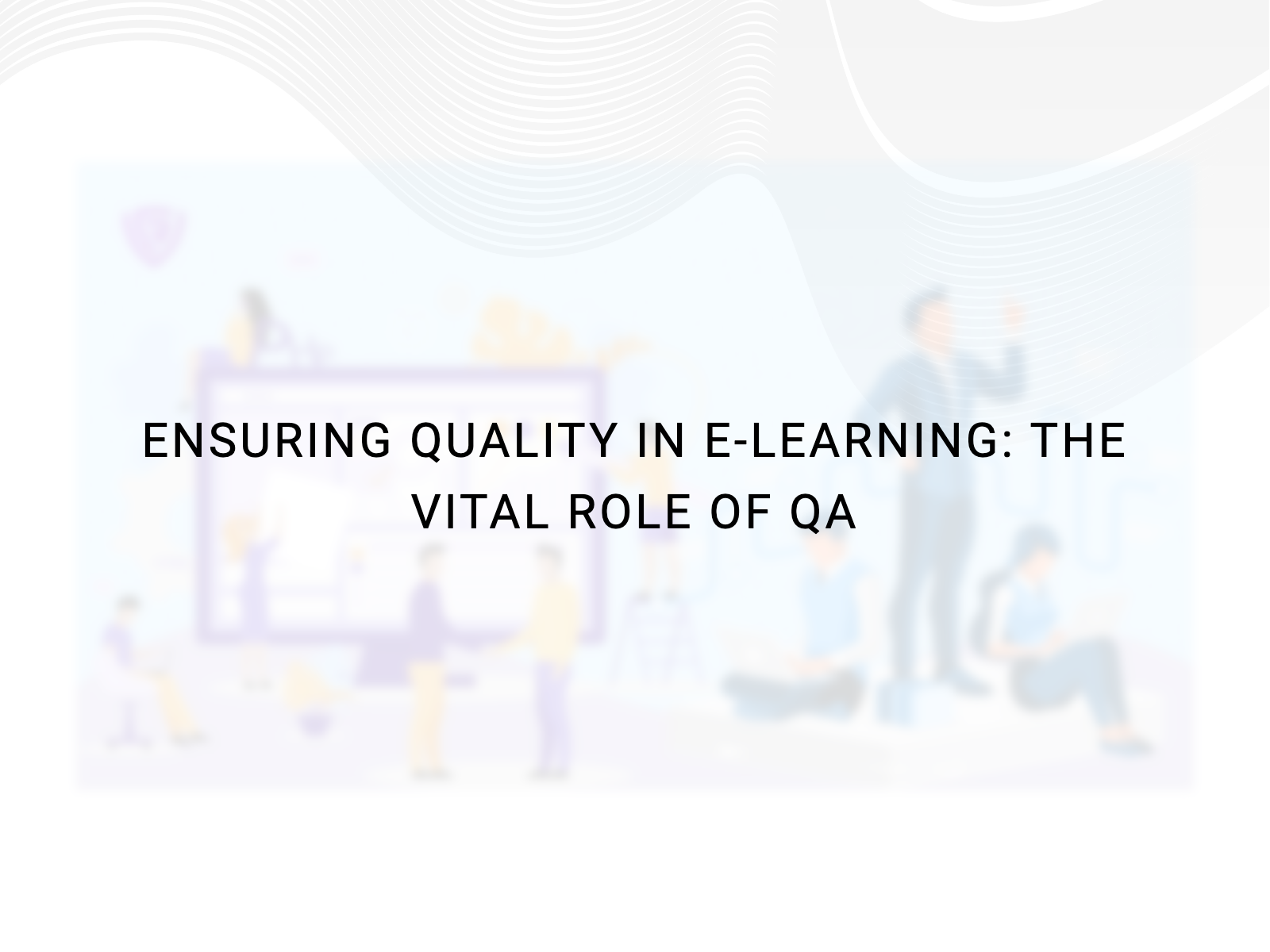Ensuring Quality in E-learning: The Vital Role of QA
Fri Jul 19 2024

Ensuring Quality in E-learning: The Vital Role of QA
Introduction
In today's digital age, where the majority of content is consumed online, the education sector has undergone a drastic transformation where many of us now attend courses through various e-learning platforms, reflecting the shift towards flexible and accessible learning options. E-learning has revolutionized education and professional development by offering unprecedented flexibility and accessibility. As this mode of learning continues to evolve, ensuring the quality and reliability of e-learning platforms has become increasingly crucial. Quality Assurance (QA) plays a pivotal role in achieving these objectives, ensuring that e-learning solutions not only operate flawlessly but also deliver a positive and effective learning experience for users worldwide.
Understanding E-learning and its Challenges
E-learning, or electronic learning, utilizes electronic media and the internet to deliver educational content. This approach allows learners to access a wealth of resources, learn at their own pace, and engage with instructors and peers across geographical boundaries. Despite these clear advantages, the complex nature of e-learning platforms poses numerous challenges. These include ensuring seamless functionality, optimizing user experience, maintaining content accuracy, reinforcing security measures, and enhancing scalability. Addressing these challenges is essential to sustain the effectiveness and reliability of e-learning solutions in today's educational landscape.
The Critical Role of Quality Assurance
Ensuring Functionality
Functional testing identifies and rectifies issues before they affect the user experience, ensuring a seamless learning journey:
Course Navigation: Smooth navigation is essential for an intuitive user experience, free of broken links or confusing layouts.
Assessment Tools: Quizzes, assignments, and exams must accurately record and process user inputs to provide meaningful feedback.
Multimedia Elements: Videos, audio files, and interactive features should load seamlessly across different devices and browsers.
Enhancing User Experience
A positive user experience is crucial for learner engagement and satisfaction. QA creates an inclusive and user-friendly learning environment by addressing the following aspects:
Usability: Ensure that the platform is intuitive and easy to use for learners of all ages and technical proficiencies.
Responsive Design: Verifying that the e-learning platform performs well on various devices such as smartphones, tablets, and desktops.
Accessibility: Ensuring the platform meets accessibility standards such as WCAG so that it is usable by learners with disabilities.
Maintaining Content Accuracy
QA safeguards content quality, reinforcing the credibility of e-learning materials:
Educational Material: QA verifies the accuracy and clarity of instructional content, ensuring educational integrity.
Multimedia Synchronization: Timely and synchronized delivery of audio, video, and textual content enhances learning effectiveness.
Interactive Elements: Functionality checks for interactive features like simulations and exercises ensure they contribute meaningfully to the learning process.
Ensuring Security and Data Privacy
Robust QA practice is needed to ensure the security and integrity of user data, which is crucial for maintaining trust and compliance. E-learning platforms often handle sensitive data, including personal information and academic records:
Security Testing: Identifying vulnerabilities to protect against data breaches, unauthorized access, and other security threats.
Compliance: Ensuring that the platform complies with relevant regulations, such as GDPR, FERPA, or COPPA, depending on the target audience.
Supporting Scalability
As the number of users grows, the platform must scale efficiently. QA prepares e-learning platforms to scale efficiently, maintaining performance and reliability as demand increases:
Stress Testing: Assessing how the platform performs under peak usage times.
Load Testing: Ensuring that the platform can handle simultaneous access by thousands of users without degradation in performance.
Facilitating Continuous Improvement
Quality assurance is not a one-time activity; it is an ongoing process. Continuous testing helps maintain the platform's quality over time, adapting to evolving user needs and technological advancements:
Regression Testing: Ensuring that new updates or features do not introduce new issues or break existing functionality.
User Feedback Integration: Regularly incorporating user feedback to enhance platform features and address pain points.
Conclusion
In the competitive landscape of e-learning, the quality and reliability of your platform can make or break its success. QA is essential in ensuring that e-learning solutions are functional, user-friendly, accurate, secure, scalable, and continuously improving. By investing in a comprehensive QA process and techniques, the team can deliver superior educational experiences, ultimately contributing to better learning outcomes and higher user satisfaction.
About Testing Mavens
At Testing Mavens, we specialize in providing end-to-end testing services designed to meet the diverse needs of our customers. Whether you're looking to shift left or do a simple load test, our approach is always customized and focused on achieving your goals efficiently.
Follow us on Medium also.


